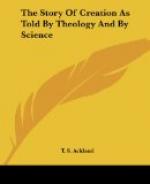In the next place, it does not seem probable that that dissolution of the body which was the natural lot of all other animals was the whole, or even the chief part, of the evil consequence of Adam’s fall. That it was included in the penalty seems probable, but it only constituted a comparatively unimportant part of that penalty. The threat was, “In the day that thou eatest thereof thou shalt surely die,” and we cannot doubt that the Divine words were exactly fulfilled, though Adam’s natural death did not take place for many hundred years. But the guilty creatures, covering their nakedness with fig-leaves, crouching among the trees of the garden in the vain hope of hiding themselves from the face of their Maker, who were to transmit an inheritance of sin and shame and misery to their yet unborn posterity, were surely very different beings from those whom the Creator but a short time before had pronounced “very good.” The true life of the soul was gone; the image of God defaced. This was the real, the terrible death. If death in its full sense means nothing more than the dissolution of the body, our Lord’s words, “He that liveth and believeth in Me shall never die,” have failed of their fulfilment. That promise has been in force for more than eighteen centuries, and yet no case has occurred of a Christian, however holy he may have been, or however strong his faith, who has escaped the universal doom. The Church of the Patriarchs could point to an Enoch, the Jewish Church to an Elijah, who were exempted from the universal penalty; but Christianity can point to no such exemption, nor does she need it. To her members, to die is to sleep in Jesus; to be absent from the body is to be present with the Lord, for the penalty of death is cancelled.
Though, then, it seems by no means improbable that Adam, if he had not fallen, would have been exempt from the dissolution of the body, yet this is not absolutely certain, and even if it were certain, his case would be an exceptional one: no inference as to the immortality of the animal creation could have been drawn from it.
The supposition that all animals prior to the fall lived entirely on vegetable food rests partly on this groundless inference, and partly on the Divine Words recorded in verse 30: “And to every beast of the field, and to every fowl of the air, have I given every green herb for meat.” But it is important to notice that these words are not recorded as addressed to the animals, like the command to be fruitful and multiply. Had this been the case, any omission to mention the flesh of other animals, might have been looked upon as significant. Instead of this they are addressed to Adam, and they follow other words in which the same things are assigned to Adam for his food. They come then in the form of a limitation to the rights granted to Adam, rather than of a definition of the rights of the lower animals. Adam was to have the free use of every green herb,




